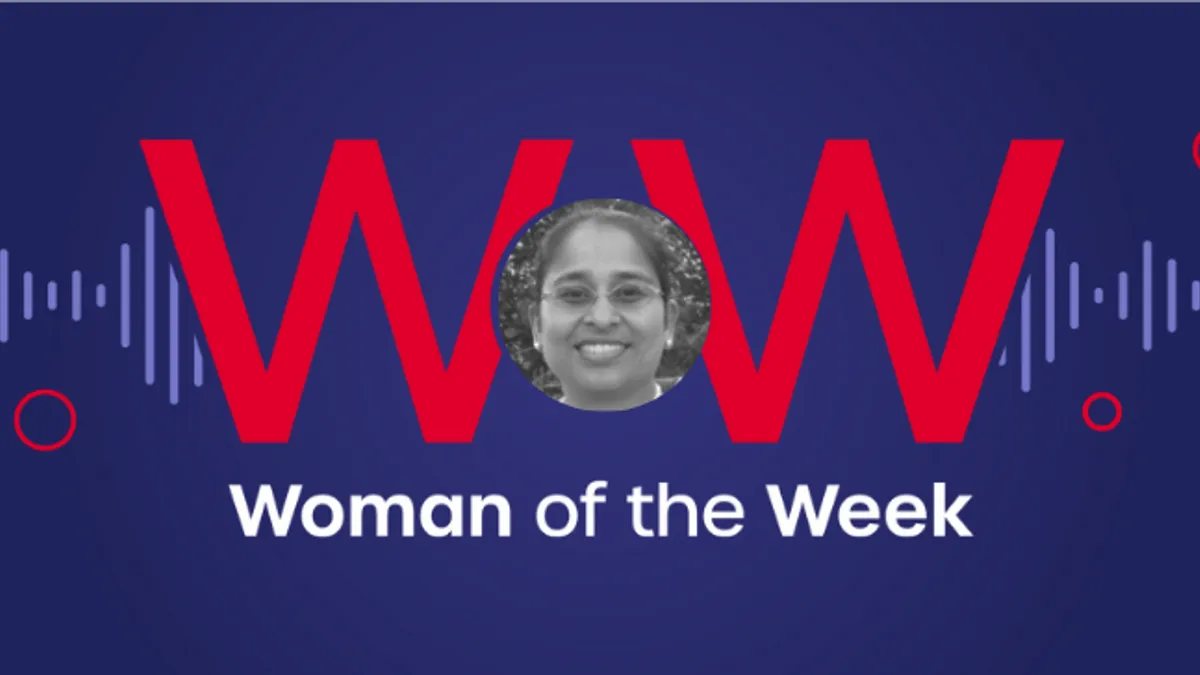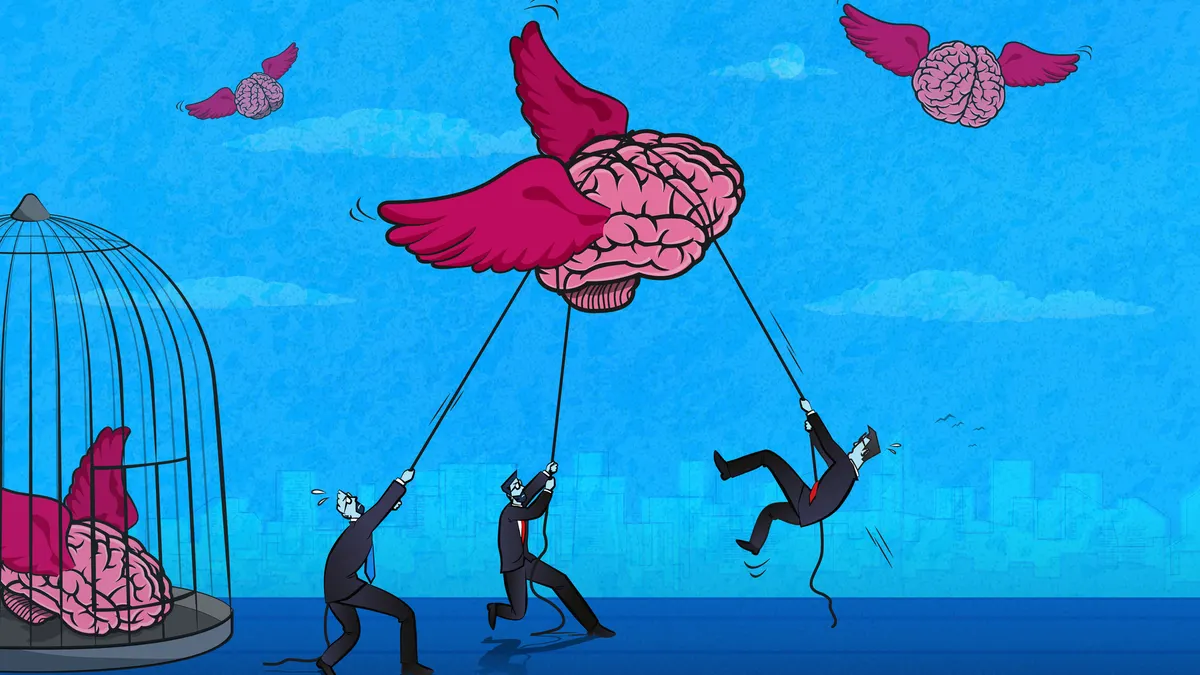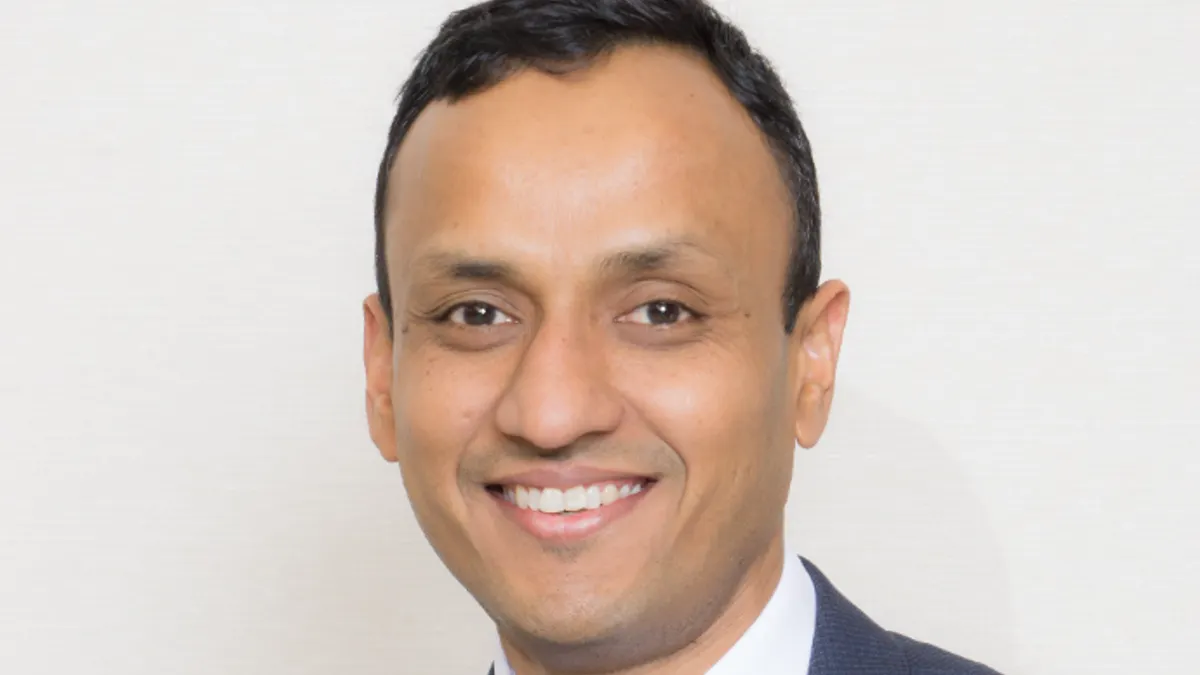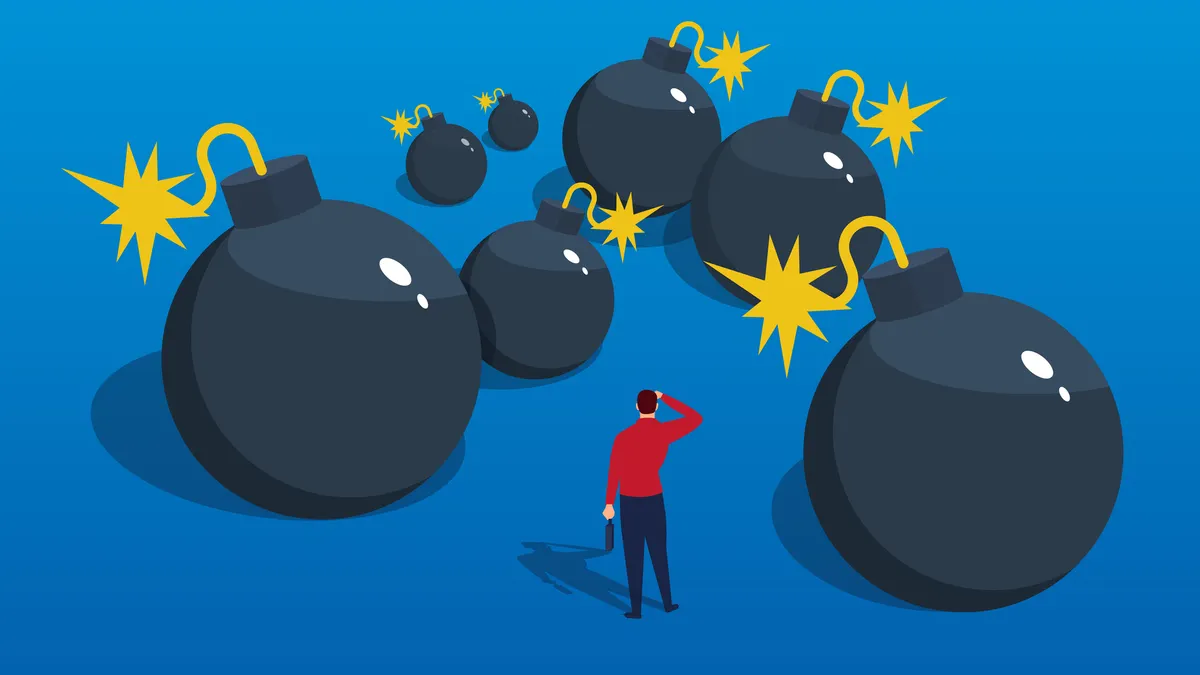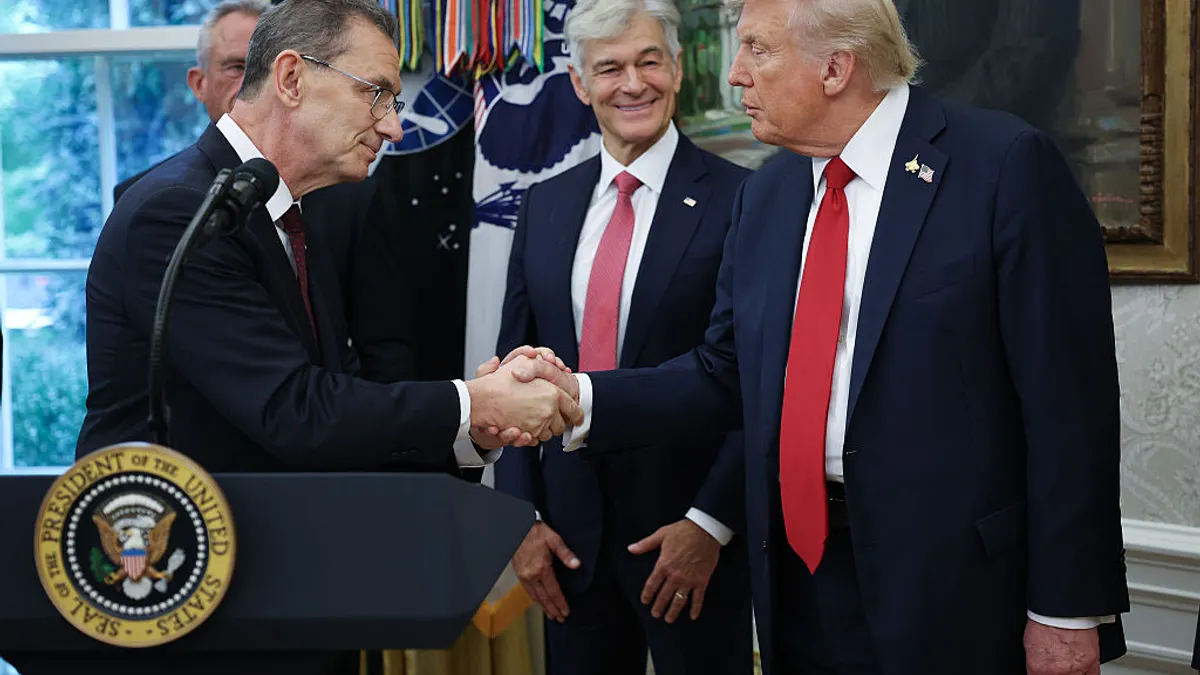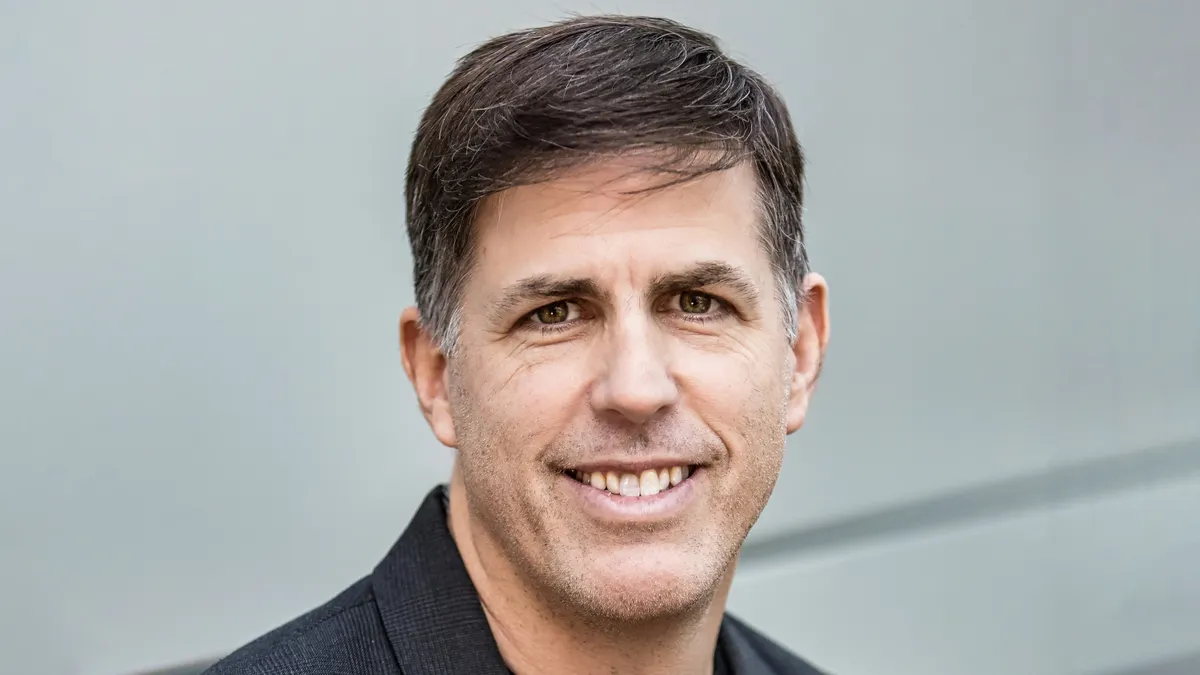Welcome to the Woman of the Week podcast, a weekly discussion that illuminates the unique stories of women leaders who are catalyzing change throughout the life sciences industry. You can check out all our podcast episodes here.
Career serendipity doesn’t happen for everyone. But for Dr. Shanthi Ganeshan her first industry job as a regulatory affairs associate at Abbott Laboratories led to a career-long pursuit of bringing much-needed oncology products to patients.
She jokes that most people land in the regulatory department after mastering other functions, but she was hooked from the start.
“I find regulatory affairs to be the perfect mix of internal and external interactions,” she says. “Internally, I’m at the helm to develop a global development strategy with my counterparts and peers.”
Externally, she says she translates this information for global health authorities, to ultimately deliver products to patients.
“I would say generally in regulatory, but especially in oncology, there’s never a dull moment because the treatments are constantly changing and there are new mechanisms of action,” Ganeshan says. “And if there’s one area that you can push and advance regulatory science, it’s in an area of unmet medical need with a life-threatening disease.”
As vice president, Global Regulatory Affairs, Oncology, Gilead Sciences, Ganeshan and her global team oversee more than two dozen oncology pipeline products.
“My goal with my group is to be a global strategic partner,” she says. “Ultimately, we want to come up with innovative strategies because life is short, especially for these cancer patients.”
Ganeshan says patients are her “North Star” and harkens back to her early days working in a cytogenetics lab when she had a chance encounter with a young woman who was about to undergo treatment. Ganeshan knew this woman’s prognosis was not good, yet was still struck by how much her condition had impacted her appearance. The next time she saw the patient in the waiting room, she had aged so dramatically in such a short amount of time that she “had lost all of her long, beautiful hair.”
“I was so overwhelmed,” she says. “The only thing I could think about was, I wish at some point in my career I can do something to help people like this. I often tell my teams, ‘We’re working for that patient.’ We’re all doing our small pieces, but think of the patient, think of the product, think of that small bit that you’re doing to contribute to that patient and the impact that you’re creating.”
In this week’s Woman of the Week episode, Ganeshan talks about her 20-plus-year quest to change the oncology landscape on behalf of patients, her secrets to building high-performing teams and what she’s doing to widen the path for other women.
Welcome to WoW, the Woman of the Week podcast by PharmaVoice, powered by Industry Dive.
In this episode, Taren Grom, editor-in-chief emeritus at PharmaVoice, meets with Shanthi Ganeshan, vice president, Global Regulatory Affairs, Oncology, Gilead Sciences.
Taren: Shanthi, welcome to the WoW podcast program.
Shanthi: Well, thank you so much Taren for having me.
Taren: Dr. Ganeshan you received your Ph.D. in molecular biology. What drew you to the field and your interest in science initially?
Shanthi: I’m not sure if you know, but I grew up in India and generally speaking, children at that time were encouraged to usually pick a career in either engineering or medicine. This is all I used to hear about is my daughter or my son is going to medical school or engineering school.
So, that was sort of in the back of my mind as I started going to school and during high school, I instinctively sort of found myself gravitating more towards biology. And so naturally I thought, maybe I should attempt a career in medicine. But getting into medical school anywhere is not that easy. So I graduated from high school six months early with the intention of studying for medical entrance exams. But then, there was this one college in India that accepted students in the winter semester that also offered an integrated master’s program in biology. So, I took a chance and I applied, and before I realized, I got admitted and I was in college.
So, a medical career was sort of history at that point. But as I started navigating my undergraduate and I became very interested in research and my master’s thesis – which I had the fortunate opportunity – was done at the Cancer Institute in Chennai where I worked in the cytogenetics lab. And this really piqued my interest in molecular biology. So these projects that I was involved in and also liked more importantly, the possibility of what research had to offer logically led me to pursue my Ph.D. And when I got to Northwestern, I was again fortunate that I had a topic in HIV which further strengthened my passion in molecular biology in this area of research.
Taren: Wow. So mom and dad weren’t too upset that you didn’t become a doctor, an M.D., but it was okay with the Ph.D.?
Shanthi: Absolutely. In fact, my mother was thrilled because she always thought, ‘oh gosh going into a career in medicine you’re going to be working all sorts of hours.’ So she was actually very pleased when I stepped away from the medical career, to be honest.
Taren: That’s funny. So then working in the HIV area that was at a time where things were still really rapidly developing, yes. And so, how exciting was that kind of medicine happening?
Shanthi: That was super, super exciting and I worked at Dr. Wolinsky’s lab at Northwestern, and he had so many collaborations with different physician groups. And I again, was sort of matched up with this one group from UCLA, and we worked on maternal to infant transmission of HIV. It was very rewarding to really look at what actually happens sort of behind the scenes and what may sort of help prevent some of that transmission.
Taren: That is very rewarding. You spent a number of years working in academia. What was that like?
Shanthi: Academia was interesting, but towards the end of my graduate study our lab was asked to beta test HIV diagnostic kits. And so I thought, wow, this is a very unique experience. Like you’re sort of repeating these tests over and over again, you’re trying to validate them and that was really my sort of insight to say, ‘oh, I wonder how industry develops such diagnostics or drugs and takes them to market to ultimately reach patients.’
So that sort of was kind of what led me more from academia into sort of the life sciences world, if you will.
Taren: Got you. So tell me, what was your first life sciences job?
Shanthi: I worked at Abbott Laboratories, and it really was in regulatory. So most people ending up in regulatory worked in other functions, but I almost started in regulatory. And I think the reason they were willing to take someone who didn’t have any industry experience in regulatory was this was regulating the HIV and HCV diagnostic kits. So when I spoke to them, I said I’ve done the HIV research. I understand the biology. I understand the science and we’ve also helped beta test some diagnostic kits. So I have some sort of vague idea on how this happened. And I said, I should be able to read the regulations and pick this up.
I still remember my first manager, I think she almost went out on a limb to give me that job because I did understand the science, but I think once I got there regulatory was just so interesting that there was really no turning back.
Taren: I was going to say, it was a serendipitous moment for you in looking at your bio, because as you said you didn’t necessarily have the experience. But how good of that woman to understand all the other skills you can bring to the table. So terrific. And you have followed a regulatory path now throughout your career.
Shanthi: Yes. Yes, I have. It’s been super rewarding. I think not only have I focused on regulatory, and I think regulatory, I found it to provide like the perfect mix of internal and external interactions. You’re sort of at the helm internally to develop a strategy, a global development strategy with your counterparts, with your peers. And then you’re sort of at that position where you have to translate this information to deal with, to interact with global health authorities, ultimately facilitating these products for patients. And especially in oncology, I mean, I would say generally regulatory, but especially in oncology. There’s never been a dull moment in regulatory because the treatments are constantly changing and there’s new mechanisms of action. And if there’s one area that you can sort of push and advance regulatory science, I think it’s in an area of unmet medical need with a life-threatening disease.
And so, from a regulatory perspective, it’s very exciting to be able to work with the regulators, to be able to work with your company to see how you can get these products to patients.
Taren: I was going to ask you because I’m looking at Gilead’s pipeline and it has a robust oncology and cell therapy pipeline. So as you talk through the complexities of these new medicines it is a very exciting time to be at the helm there of regulatory. So what are some of those conversations like with regulators either in the US or ex-US? Like what are they looking for and how are they understanding these new science? And what is your role play in educating them?
Shanthi: So, that’s a great question Taren, and it’s not something that directly meets the eye. But I think when you talk to regulators, you have to start asking questions that you don’t necessarily know the answers to. Because it’s part of their role to help the companies and to direct the companies to say, ‘if you go down this path, these are sort of the endpoints we’re looking for. Or these are the kind of clinical trials we’re expecting you to design if you’re doing combination studies.’ We want to know the contribution of each of those components in your drug, because when you’re again, talking about oncology drugs, there is a lot of side effects, and it’s really important to know, when you’re adding two drugs to a regimen, you’re adding toxicities, but is it actually also benefiting.
So you have to go to the regulators and sort of tell them, well, if I develop a program that follows this sort of a pathway, can or will I be able to get the drug to market? And these are the discussions that you would have with global health authorities, which will then help you design a truly global study. Because at the end of the study, you want the drug to be able to impact as many patients as possible.
So really, the goal with what I do with my group is to really be global strategic partners. We work with our internal teams. But ultimately, we want to come up with innovative strategies because life is short and especially for these cancer patients. So we want to see how quickly we can get it there but also following health authority advice.
Taren: Wow. And on a global basis, I just can’t even imagine how you get your arms wrapped around that. So what are some of the things, do have a typical day? Like what does a typical day look like for you?
Shanthi: A typical day could be anything from some health authority has requested certain questions of you and we’re sort of scrambling. They’ve looked at certain data that you’ve sent them and they’re like, we need a response tomorrow. So you’re bringing the teams together. You’re trying to get a response and you’re trying to make sure your management is aligned and you’re getting this out. So that I think, could be one of the typical days. You could have applications under review. So at any point in time, health authorities could come and ask you about the application. You could be doing label negotiations. This is the fine print that you see in medicines as you’re trying to get your product to market, or I often like to spend a lot of time with my teams, with my regulatory team. So it’s team meetings, it’s understanding their programs, it’s me, trying to share my experience with them and so, I can help them grow in their career.
So I would like to think it’s a little bit of everything, which is, I think, what keeps you on your toes and constantly thinking and learning and adapting, which is, I think very key in any job at this point.
Taren: Sure. How many teams do you have around the world? I’m assuming you have a couple working here, there, everywhere.
Shanthi: So we have a group in the US which is now split between Foster City and New Jersey. I have a group in the UK. We have a lot of support from all of our affiliates and everything, but this is my immediate team is really based in the US and in the UK.
Taren: It’s still quite a number of time zones to have to manage. So what does that mean in terms of management strategy? Do you have a group call once a week that’s at a common time? Because you are working virtually then too.
Shanthi: Yes, very much so. We do end up having a group call that’s with my entire regulatory team about once a month. But I do meet with my direct reports, usually once every couple weeks, if we need to throw in once a week, we do that. It really depends on the need basis. But the advantage is being based in New Jersey, I have more overlap with the UK and with California.
Taren: Sure.
Shanthi: So it really helps for me to have that time zone. And the one thing we have struggled with is the time zone between California and the UK is a little difficult. But me trying to be in the center, I think it really helps me do my job better.
Taren: Perfect. Let’s go back to the pipeline, if we could. What is it about the drugs that Gilead is developing that excites you?
Shanthi: So, for me, it’s definitely the science, the portfolio, and the commitment Gilead has towards oncology. I think over the years oncology treatment has really moved from say, one drug treating the disease to combinations. And also now, including what we’re calling companion diagnostics, so you’re able to say, if you take lung cancer, for example, you’re not necessarily developing a drug for all of lung cancer, which you could be. But you’re also saying, if you have a specific molecular alteration, this specific drug is going to work on that better. So that’s like where the companion diagnostic comes into play.
So more and more on the oncology treatment landscape is not just seeing definitely not monotherapy, but it’s also seeing more doublet and even triplets, triplet combinations in clinical trials. And I think from that perspective, what really excites me about Gilead is, I think we’re very well-positioned with the broad pipeline to be able to combine our medicines and to really investigate the next generation of counter medicines for patients. And I honestly feel very privileged to be at Gilead during these very exciting times.
Taren: I’m excited to hear about the advancements that are being made. Obviously, there’s a lot of unmet need there. So we’re really now looking at, as you said, more than one therapy; we’re looking at two therapies or a combination even of three therapies and then with a diagnostic. That feels like it’s a complicated protocol. How does that impact the development?
Shanthi: So obviously, with more therapies added on and with companion diagnostics, it does get very complicated, I have to tell you that. The one thing, I think we as an industry are really struggling with is to be able to get patients for all of the clinical trials that are going on. So internally, I think a lot of times you’re doing what we call add-on. So there’s already an approved regimen and you’ve come up with a new drug, which will work with that mechanism of action. So, you’re adding on to an existing regimen, and then you’re comparing it to the regimen that’s already being used.
So as much as it’s complicated because you’re probably adding one drug to a two-drug combination already, it’s an existing treatment. I think the physicians and the people working on the clinical trials are always looking for innovative approaches for that next drug that’s really going to benefit the patient. So, it is complicated, but I think within the oncology framework, doctors, and patients first and foremost, as well as the companies have figured out a way and we’re still sometimes figuring out the best way. But we somehow make things work because that’s going to be the next advancement for patients.
Taren: It sounds very systemic. It feels very logical. It feels very processed. So that’s good. So thank you for explaining that, I appreciate it. We’ve talked about your career has been extremely successful. I’d love to delve into a little bit about some of your leadership traits, if you could. What are some of those things that you look for when you want to put together a high building or a high-performing team rather?
Shanthi: Before you can actually in my mind, build a high-performing team it’s essential to bring together the right group of individuals. So for me, it’s very important to match the right people for the right roles. Because everyone has their own aspirations and also has their own strengths. So it’s really important to be able to sort of tease out for your aspirations, for your background this role is going to be the right role that’s going to give you the opportunity to grow and to sort of seek and work towards your aspirations. So bringing together that team is key. And once you’ve gotten some folks, you’re working on the others, but the team is coming together it’s so important for me to set common goals with clear roles and responsibilities. Because each one of us is working in our sort of small piece of the puzzle. And so, it’s very important to align everyone behind a larger purpose.
I often tell my teams, “we’re working, at least in my mind, we’re working for that patient.” That’s what we’re doing. We’re all doing our small pieces, but think of the patient, think of the product, think of that small bit that you’re doing to contribute to that patient and the impact that you’re creating.
I always also encourage clear and open communication, because I want to build a very inclusive community. I want us to be very transparent. I want us to be able to share information. Different folks are going to have different experiences working with different health authorities, but the important thing is we need to share. And we need to share that information across the group, so there is a common understanding of what’s happening, externally what’s happening internally.
And last but not least, I really would like everyone and I encourage everyone to maintain an agile and growth mindset. It’s not always about precedent. It’s not always about what we’ve always done it this way and this is how we have to do it. We always have to challenge status quo. You have to have that growth mindset, because that’s how not only you as an individual move forward, but that’s how your programs and your projects are also going to move forward.
Taren: Absolutely. It’s wonderful. That’s great advice. And as you look to the future, are you tracking any particular trends at the moment where you see that this could be the next breakthrough?
Shanthi: In terms of [inaudible 20:18]?
Taren: Regulatory or drug develop or even in the oncology space, you have your finger on the pulse of what’s happening.
Shanthi: I think over the course of the last 15, 20 years that I’ve been in oncology, the landscape has changed so much. What we thought what we’re doing today, we probably didn’t think was possible in the era of Gleevec in the early 2000. So I definitely think, if there’s any one class of drugs that could change the way we’re looking at things we are moving towards cure in many situations. If you take cell therapy, for example, or even the Gleevec’s of the world. We’re trying to make cancer go from more of an acute to a chronic disease. So we’ve succeeded in some specific cancer types, and we’re still working on many of the others.
So in some areas, I think we’re doing really well, and in some areas, we have a lot to do. But I definitely think if anyone sort of group of compounds can achieve some sort of breakthrough or some sort of cure, I think it’s oncology. But I cannot predict how long it’s going to take. Because the more you learn, the more you find out and there’s more to the puzzle.
Taren: I love that, the more you learn, the more you find out. And Shanthi, I’ll tell you, when you said that word cure – because I’ve been around long enough to know that 25 years ago or 20 years ago, you weren’t allowed to say that word in talking about a therapeutic option for cancer. Because there was no cure still, the only cure were surgical, right. But now we are hearing that word creep in more and more and how optimistic and how encouraging is that, that to move it from a death sentence in some cases to a chronic disease. It’s amazing what science has done in the past 20 years. And so kudos to you and all of your colleagues out there who are behind these breakthroughs. It’s amazing.
Shanthi: And again, Taren, I mean, I can’t say this enough, but I really feel very fortunate to have a small piece, in contributing a small piece to this much, much larger collective.
Taren: It’s amazing. So no regrets leaving academia.
Shanthi: Absolutely not. And you know what, I work with so many people in academia, not directly, but many of the early drug development in the non-clinical space. Sometimes it’s a compound that you’re working with academia that you’re bringing in or it’s your compound that an academic is actually pursuing clinical trials with. I definitely do not regret leaving my career in academia, because I think that would have been a lot more basic research which would have been good. But I think for me as an individual, I think having that patient in the forefront of everything I do gives me so much purpose.
Taren: Love it. So along your long career path, very successful again. What’s the best piece of leadership advice you’ve ever received?
Shanthi: I’ve received several pieces. And when I think about your specific question, I think the one that I’ve really taken to heart and resonates with me is to be an authentic leader. I believe that I lead by example. There is nothing that I would not do that I’m going to ask somebody on my team to do. I’ve either done it or I’m happy to roll up my sleeves and do it. So I love to lead by example. I feel I’m very genuine in my actions. I really care about my team and I want to build trust with my teams.
I also feel, I want to be very transparent in my decision making, because I think that’s kind of when you can bring people with you. And frankly, I think if you ask people who’ve worked with me or for me, what you see is what you get. I sort of speak what I think and I do like to empower my teams. I think this is part of me being that authentic leader. I want to do what I think is right for my teams, but I want to provide a safe environment for them to learn and perform. I don’t want them to keep looking behind and saying, “have I done this incorrectly? Oh my gosh, what’s going to happen?” Because ultimately, I still maintain final accountability. So I want to give them that sort of space to go, to do what you can, learn, learn from your mistakes and move on.
When I look back at my career, I was very fortunate to have worked for a specific leader for a while for several years, who started out being my coach, then my mentor and eventually, a really good friend. And a person who I’ve learned so much from that I’m eternally grateful for. And now I feel it’s my responsibility and opportunity to give back.
Taren: Let’s talk about giving back. I know that you also are an advocate for women and bringing women up to the ranks. What are you doing to widening the path for that next generation?
Shanthi: So, especially for women, I mean, it’s advice I give to most folks, but especially for women. It’s so important to build networks, both within your company or outside of your work environment, you have to invest the time. And once you’ve built that network, it’s also very, very important to build trust with your stakeholders. Because at the end of the day, you want to be viewed as a valued partner with whoever you’re working with. Because everyone has to eventually develop their own leadership style. But trust I think and building those relationships is probably from my perspective at the core of what you do. And it’s not just developing these with your superiors but you also have to do it with your peers and your draft report, and you can’t take anything for granted.
I think that goes for everyone, but especially for women. Sometimes if you don’t ask, you don't know what’s on the other side. So I encourage everyone to say, if you think you need something or you deserve something find out, find out in a nice and polite way how is it that you can get there or what is it that you’re lacking? So, don’t be afraid of asking those questions, but at the same time, be humble, have humility around that but don’t sell yourself short.
Taren: It’s a delicate balance isn’t it, to ask for what you want and feel strong enough to ask for it and still do it in a way that’s respectful.
Shanthi: I totally agree. And the reason I bring this up is, there are many times when I’m in meetings with others and we talk about some women, they’re like, “well, that person hasn’t necessarily showed interest in this or hasn’t voiced their opinions in wanting to do something.” And when you actually talk to the individual, it’s quite the contrary. They are very excited. They would want to do this, but I think they saw themselves short on, “do I think I can do this?”
So I think it’s a little bit of a nudge here where I would tell my peers, “well, you know what, can you give me a chance to go talk to this individual to see if she’s ready for this or if she wants to take on this challenge?” And more often than not, they are. So that’s when I realized, you have to be your own advocate, it’s so important.
Taren: You do it. And that’s where a sponsor comes into which is different than being a mentor and having somebody at the table to speak up for you. So those relationships have to be cultivated as well.
Shanthi: Absolutely. And I always tell people, don’t build relationships and networks in the hope of receiving something in return. Build it genuinely. Build it because you either see somebody walking into the room and you’re in awe of their presence or something that they’ve said. Go talk to them. Learn from them. Use it as a really good opportunity to get to know them. If something comes out of it later, great. But don’t go in with that premise like I’m building this relationship to get something out. Build it genuinely and you’d be surprised what happens at the end.
Taren: Absolutely. Echoes back to that authenticity piece. You have to be authentic in that as well. And you’re right you can’t expect something out of it. You do it with all intents of just looking for nothing in return. So, very key. Great pieces of advice. So, obviously, you are a busy executive. You have a family. You have outside interest. How do you balance it all? And can you have it all?
Shanthi: Well, what I can say for me is, I think I have had it all and it’s really due to my supportive family. I have an extremely, extremely supportive husband who from the beginning has said, “you have to finish your Ph.D. it’s really important to you,” and has encouraged me every step of my way in my career. But once I had children, it wasn’t just him between my extended family, my parents and my in-laws, they have been with me through thick and thin. And if it wasn’t for this support, it was almost like a community in my own small way, helped me to be where I am. And outside of the family support, I’ve had great mentors and leaders along the way who have given me the opportunities, who believed in me, and given all of this, it’s who really made me the person that I am. And obviously, working in an area to help impact patients, I think to me, that’s truly icing on the cake.
Taren: What a gift. Now because this is a WoW podcast program, I’m going to ask you to single out a wow moment that has either changed the trajectory of your career or left a lasting impression on you.
Shanthi: So I would be really remiss, Taren, if I didn’t share a story with you. And I think that looking back was my wow moment when I was working at the cancer institute, and I was invited by one of the physicians to observe a bone marrow aspiration. And it was of this young lady and the thing that struck me most when I sort of walked into that examination room was, her long beautiful hair. I mean, it was just gorgeous. After the procedure for the next day or two, I kept thinking, “I wonder how her results turned out.” And you know, a couple weeks down the road, we got her sample in our cytogenetics lab, and when we analyzed it, the prognosis wasn’t really looking good. But, I thought about it and I just in my mind, I wish her the best.
And probably around a couple months after that, I was walking through this large lobby to get to my lab. And I sort of did a double take and there was that same lady who had the bone marrow aspirate. She was waiting to see a doctor. I could hardly recognize her. I think she must have been on a chemo regimen, now looking back having worked in oncology. But she had lost all her beautiful hair and she had looked like she aged at least a decade. And I was so overwhelmed. I mean, even talking about it now, tears well up in my eyes, but I was so overwhelmed seeing her like this. The only thing I could think about was, I wish at some point in my career, I can do something to help people like this.
And thinking back, at that point I had no idea I was going to be this fortunate to be working in oncology to be able to give back to patients in need. But, every time I hear patients who come to our companies who used our drugs talked about their experienced with our drug it’s so heartfelt. They thank us and they say, it helped me seeing my grandchild being born or a child graduate or go to college – I feel like so honored and privileged to have worked in oncology all these years and doing my part in drug development to bring drugs to these patients. And I think that to me is my sort of North Star. And I keep going back to the patient and what little I can do for them.
Taren: That is a wow moment. Totally aspirational. And it’s those moments in time that just are frozen for one. And at the end of the day you don’t know exactly what happened to her. But you hope that at the end of the day it turned out okay, but chances are it may be didn’t. But I love the fact that you want to make a difference for other patients like her. So thank you so much for devoting your time, talents, and treasures to making a difference for patients.
Shanthi: It’s my honor and I feel very privileged to be in this career and doing everything I can.
Taren: It’s been delightful to speak with you. Thank you so much for being part of our WoW podcast program.
Shanthi: Thank you so much, Taren for giving me this opportunity. It was wonderful speaking with you.
Thanks for listening to this episode of WoW, the Woman of the Week podcast. For more WoW episodes visit pharmavoice.com.

 Podcast
Podcast

